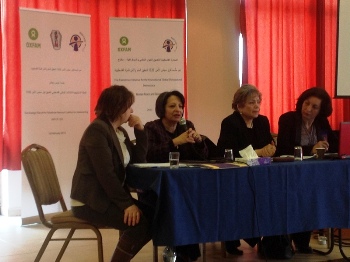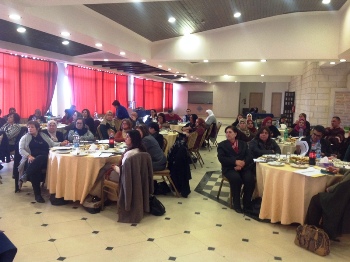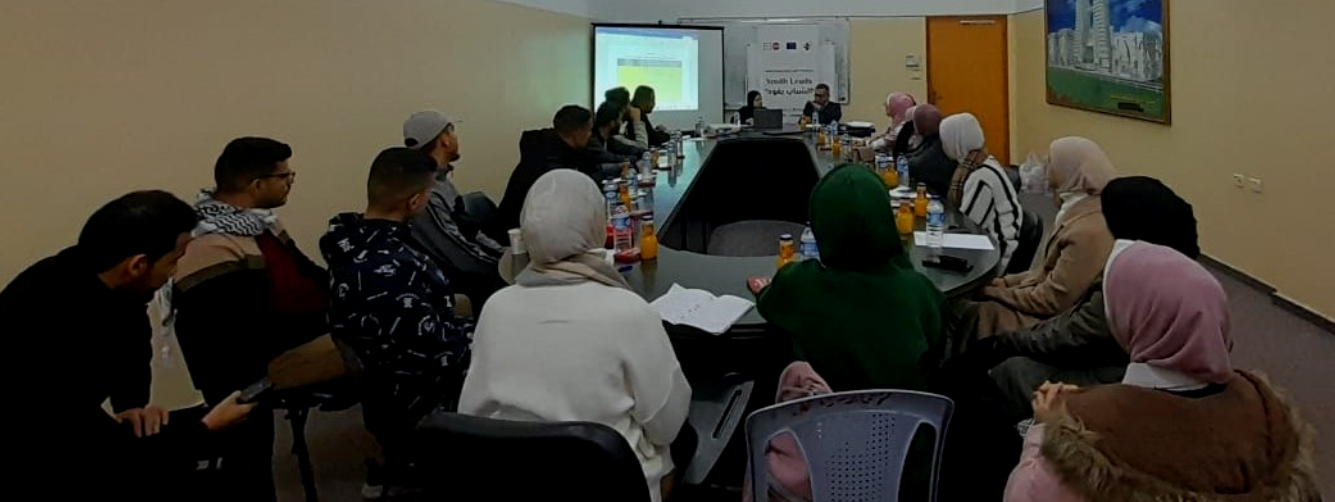
Ramallah – In a meeting held at the Red Crescent Society headquarters in Al Bireh, The National Coalition for Implementing UNSCR 1325 in Palestine along with a group of human rights experts presented its strategic advocacy plan for implementing the resolution, which focuses on the security and protection of Palestinian women and on achieving a just and comprehensive peace.
Opening speeches
The meeting was opened by Intisar Al Wazir, President of the General Union of Palestinian Women (GUPW). Al Wazir thanked all the members of the Coalition’s Secretariat who participated in formulating the plan. She also thanked OXFAM-Novib for its support in realizing this plan through MIFTAH’s project: Institutionalizing UNSCR 1325 to achieve peace and security for Palestinian women. Al Wazir showed her appreciation for the participatory efforts between the Coalition’s organizations, which she said constituted the first steps towards achieving protection for Palestinian women and supporting their national cause.
Dr. Feidy: The plan belongs to the National Coalition
MIFTAH CEO Dr. Lily Feidy reaffirmed that MIFTAH’s role in the coalition is part of the organization’s strategy in supporting Palestinian institutions . She said the strategic plan was up for discussion and belonged to the National Coalition. Feidy explained that this was part of MIFTAH’s continuous support to empower the status of Palestinian women. “Based on MIFTAH’s belief in the need for concerted efforts between civil society institutions in the quest for achieving integration, especially in regards to women’s rights and her systematic integration into decision-making positions, MIFTAH seeks to enact its membership in the National Coalition for Implementing UNSCR 1325 in Palestine,” Feidy said.
She went on to say that the gathering to discuss the plan is part of a series of activities MIFTAH is implementing in full coordination with the GUPW in its capacity as a coordination body of the coalition. The meeting was also in accordance to the memorandum of understanding signed between the two parties for 2014-2015 within MIFTAH’s project to institutionalize UNSCR 1325, she said.
MIFTAH considers the activation of its membership in national coalitions and alliances as part of its strategic plan and supports the strategic plans of these coalitions, said Feidy, adding that she hoped the discussions would enrich the strategic plan.
Presentation of the plan’s components
The speeches were followed by a presentation given by Lamya Shalaldeh, a women’s activist and expert in the field in women’s protection under international laws. She presented the components of the Coalition’s strategic advocacy plan to the audience, saying it was the product of a purely Palestinian effort. Shalaldeh explained that the plan was based on international and local legal references and was an ambitious plan aimed at first activating UN Resolution 1325 and eventually reaching an end to the Israeli occupation.
Shalaldeh said the plan represented a specific part of the resolution pertaining to women under occupation, adding that everything related to the plan was defined by this specification, which includes ending the occupation and holding criminals accountable for their crimes.
The overall executive framework for the plan, as presented by Shalaldeh, is based on several points including: participation, protection and accountability, and prevention.

Presentations
Following presentations described the plan as comprehensive and based on legal foundations. However, they said it did not address the internal conflict, represented in the division, reconciliation and to the armed internal conflicts. The participants noted that women should be included in this file, indicating that the plan needed development in this regard.
The presentations called for broader participation by women in resolving conflicts, in national negotiating committees and in the public freedoms and the social reconciliation committees. They also called for creating legislation that guarantees the protection of women’s rights, something which can only be achieved if there is a Legislative Council resultant from new and free elections. They stressed on: the need for participation in holding the occupation accountable and also the international community in taking other measures to hold it accountable; promoting the boycott campaign against the occupation and withdrawing investments from it; investing in the CEDAW agreement, whether via the government or the community; Israeli violations against Palestinian women; and documenting the experience of women in peace and political negotiations.
The speakers pointed out that the plan was still in need of execution tools in addition to the need for qualified women who could document violations, including documenting issues on prisoners.
Recommendations
The recommendations were recapped by Ms. Amal Khreisheh, Director of the Palestinian Women Working Society for Development (PWWSD) as follows:
- The need to address the national reconciliation file and to exert pressure towards women’s participation in all of the committees formed in this regard; to give this file more attention in the plan given its relation to civil peace.
- The importance of how current developments reflect on political action, in particular the recognition of Palestine as a state under occupation with observer status at the UN, and joining several international treaties particularly the International Criminal Court; the need for the plan to adopt the issue of the coalition’s representation in the National Committee for the ICC, which was established by presidential decree.
- The need to synchronize the coalition’s vision regarding human security with definitions and concepts according to UN literature indicated in the plan.
- The need to focus on Article 30 of the CEDAW agreement regarding the status of women in conflicts and under occupation and to use it in the realm of accountability, which was overlooked by UNSCR 1325. Likewise, focus should not be put on the CEDAW points in the plan because they need special tools and mechanisms that could be used in other platforms.
- The need for activities clearly linked with BDS as a tool of accountability against Israel so it does not escape punishment.
- The need to specifically indicate pressure on Israel and pressure on European and international parties to develop a political will regarding the rights of Palestinian women to live in security and a just peace and in order to recognize the right to self-determination.
- The plan addressed all points of UN Resolution 1325
- The need to concentrate on women’s participation in negotiations and in the political arena at the level of decision-making.; the need to develop indicators that will reflect a national and women’s perspective and the actual needs that express women’s interests , not only from a quantitative but a qualitative perspective.
- The need for the plan to fall back on specific mechanisms and tools; action towards developing an executive plan with clear outputs.
- Refraining from a mechanical separation between international humanitarian law and agreements regarding women’s participation in peace making and in the issue of the effects of war on women, especially in terms of the last Israeli aggression on Gaza in the summer of 2014. This calls for the use of all available mechanisms such as a fact-finding mission into the events in the occupied territories between June until the end of August, 2014, all of which can be used as tools of accountability.
- The importance of documentation and giving it more weight in the plan
- The need for the plan to reflect the rights of Palestinian women everywhere and not just in the occupied territories; that is, while there is a focus on refugees in the plan, it is also important to indicate to the interests and rights of Palestinian women in all places in the Diaspora.







